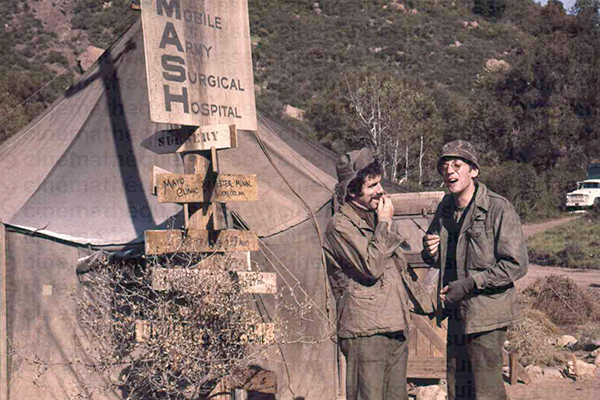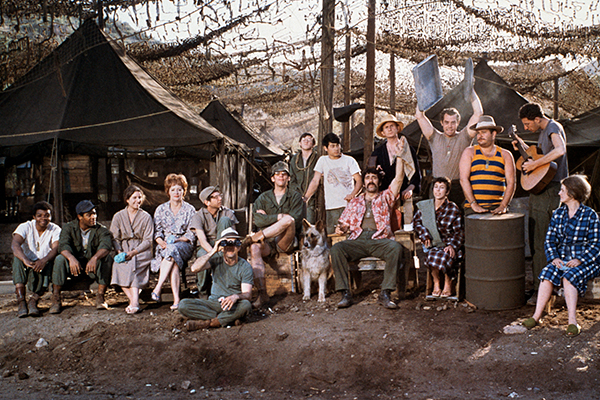The crazy adventure of
M*A*S*H
Posted on 15.10.2023
This movie belatedly launched Robert Altman's career despite protests from just about everyone: his screenwriter, his producers and almost all his leading actors. Here's a look back at a unique adventure that gave birth to an instant classic.
Their names were Stanley Kubrick, Sidney Lumet, George Roy Hill, Sydney Pollack and some fifteen others. At the end of the 1960s, they all received (and turned down) the same proposal: making a film based on a screenplay penned by a former blacklisted director, Ring Lardner Jr., adapted from the book by a surgeon who, under a pseudonym, recounted his experiences in a military hospital during the Korean War. The producer, Ingo Preminger, Otto's brother, resigned himself to a change of direction, offering the project to a director who was almost 45 years old and far less prestigious. The latter’s first movies were not very successful, but he had built up a certain reputation on television, shooting numerous episodes of series.
In fact, Robert Altman's reputation was twofold: he was a great talent, capable of injecting truth into any story, but he was also a rebel, resistant to all authority, if not downright uncontrollable. One of his most infamous conflicts pitted him against Jack Warner, head of the studio of the same name: watching the rushes of a science-fiction film called Project Moon Base, Altman was horrified to discover that the characters interrupted each other and sometimes spoke at the same time - like in real life, perhaps, but not at all like in the movies. Altman was fired on the spot; his belongings were left outside the studio gates and the film was reedited without him.
 M*A*S*H, 1970
M*A*S*H, 1970
Altman thought the screenplay for M*A*S*H was rubbish, and even worse than the book that inspired it, which he considered racist and full of bad jokes. But he had been battling for several years with a project (The Chicken and The Hawk) that was to take place during WWI, involving the fledgling aviation industry, which had little chance of coming to fruition. “When I received the script for M*A*S*H," he told critic David Thompson in Altman on Altman, "I thought it was terrible and, at first sight, I felt it wasn't going to work. There were no supporting characters; it was just five people and a load of extras. But I said to myself that I could make this film by doing the same thing that I had intended to do with The Chicken and the Hawk, breathing life into it."
To improve the script, Altman used his secret weapon: group work. Here he was in San Francisco, encountering the troupe of the American Conservatory Theatre: "When I started, the only two people already cast were Donald Sutherland and Elliott Gould. I went to San Francisco to do the rest of the casting for the film. I don't know what kind of theatre you call it, theatre of the absurd, I guess, but there were about forty people on stage at any one time, and it was very improvised. If you look at the credits for M*A*S*H, it says Donald Sutherland and Elliott Gould and ‘for the first time on screen’, and there are about twenty names. Well, it was all those people from San Francisco.”
These twenty or so speaking roles, each line naturally overlapping with the next, gave the film its uniqueness: the viewer always arrives in the middle of an incident rather than at the start of a scene, and something is always in the process of happening in the background or in a corner of the picture, like the "democratic choir" in Chekhov's plays. But it got to the point where Donald Sutherland and Elliott Gould ended up complaining to the production about a director who was more concerned about the extras than with them and requested that he be replaced. Altman: "I think that if I had known this at the time, I would have resigned. I mean, I couldn't have carried on if I'd known they’d had that attitude. But I only learned of this after the fact. Later Elliott called me and said, 'We've made a terrible mistake because we thought you didn't know what you were doing.’" The actor confirmed: "In retrospect, I think Donald and I had become two elitist, arrogant actors who didn't understand the genius of Altman."
The chaotic narrative of the picture corresponded to the disorderly behaviour; the tragic-burlesque success of M*A*S*H, where certain scenes evoke the outlandish humour of Monty Python, was the contrast between the raging war and the island of bawdy life of the military field hospital. The surgeons received the wounded in various states, operated and amputated, spurting blood as they proceeded, all the while wondering about the quality of the martinis and the temperament of the nurses they might seduce (later, Altman responded to certain critics by pointing out that he was not misogynistic, but that his characters were).
 M*A*S*H, 1970
M*A*S*H, 1970
In fact, Altman drew on his own memories of the Pacific War, during which he co-piloted a B-24 bomber, carrying out raids over Japanese-occupied territory. In between missions, there was plenty of fun to be had: "We were on an island with an Australian hospital, and it was great, because there were nurses there and we stole jeeps, smuggled whisky in and threw parties. We'd commandeer planes to bring in beer from Australia... all that was just part of our daily routine."
Released in January 1970, the film was an immediate hit, climbing to third place at the box office that year. Four months later, M*A*S*H competed at the Cannes Film Festival and won the Grand Prix (the equivalent of the Palme d'Or at the time) beating out Elio Petri's Investigation of A Citizen Above Suspicion. “The English filmmaker Karel Reisz was on the jury," recalls Volker Schlöndorff, the last surviving member of the jury, more than half a century later. “He had seen the film in London and told us not to despair of what we would see: M*A*S*H would make an excellent Palme d'Or winner. In fact, we were not disappointed, and I remember the enthusiasm of Kirk Douglas. Our old literary president [Nobel Prize laureate Miguel Ángel Asturias] was less interested, but youth triumphed!” A final twist at the Oscars: Ring Lardner Jr., who had hated the film ("It's not my script!") won the Oscar for Best Adaptation, the only award the film took home, despite its many nominations. He had not a word for Robert Altman, who lost the Oscar for Best Director to Franklin J. Schaffner, director of Patton. In the United States, you can laugh at war, but only up to a certain extent!
Aurélien Ferenczi
SCREENINGS
M*A*S*H by Robert Altman (1970, 1h56)
UGC Confluence - Sunday, 15 October at 3.45pm
Pathé Vaise - Monday, 16 October at 8.30pm
Cinéma Opéra - Tuesday, 17 October at 2pm
Saint-Genis-Laval - Wednesday, 18 October at 8pm
Pathé Bellecour - Thursday, 19 October at 10.45am
Institut Lumière (Hangar) - Sunday, 22 October at 7pm

